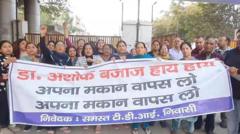A naming disagreement escalated to a divorce case for a couple in Karnataka, India. However, with the intervention of the Lok Adalat, the couple reached an agreement on the child's name—Aryavardhana—and reconciled, showcasing the role of mediation in marital disputes.
Indian Court Resolves Unique Child Naming Dispute, Restores Couple's Relationship

Indian Court Resolves Unique Child Naming Dispute, Restores Couple's Relationship
A couple from Karnataka, battling over their child's name, has had their dispute mediated by a court, ultimately leading to reconciliation instead of divorce.
In a remarkable case from Karnataka, India, a couple's protracted conflict over their child's name culminated in a legal resolution that not only settled the dispute but also prompted reconciliation between the estranged couple. This unique situation underscores the sometimes complex nature of personal relationships amid cultural expectations and individual choices.
The saga began in 2021 when a 21-year-old mother, postpartum, retained her stay at her parents' residence after refusing to accept her husband's chosen name for their newborn son. It is not uncommon in India for a new mother to return to her family home during the recovery period after childbirth. However, in this instance, the disagreement spiraled, resulting in her husband's unresolved feelings and decision not to retrieve them from her parents' house.
Instead of compromise, the mother named the child Adi, a creative blend of both their names. This decision further intensified the rift between them, leading her to pursue financial support and, eventually, a divorce. After months of proceedings, the case was transferred to the Lok Adalat, a court designed to resolve disputes amicably.
Despite initial resistance, mediation efforts culminated in a judicial recommendation for a new name, Aryavardhana, symbolizing nobility. The couple, after deliberation, accepted the proposed solution, exchanged garlands—a traditional symbol of reconciliation in Indian culture—and chose to stay together, abandoning plans for divorce.
This incident is part of a broader trend where Indian courts are increasingly involved in family disputes. A notable example occurred in Kerala last year, where a child faced school entry issues due to a blank birth certificate, ultimately resolved by the high court mandating the registration of the child's name.
This recent case showcases not only the judiciary's role in facilitating resolution in familial disputes but also highlights how cultural practices may play a significant role in personal relationships in India. The ruling emphasizes the potential for mediation to heal rifts even in situations as delicate as naming a child, ultimately showcasing the powerful intersection of law, culture, and personal dynamics.




















